 | Rising Appalachia:
'Scale Down' |
|

NEW CCDS Pamphlet
on Climate Change.
|

New CCDS Book Reporting on Vietnam
|
|
Radical Jesus:
A Graphic History of Faith 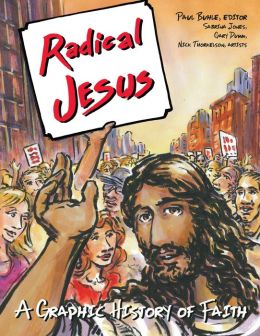 By Paul BuhleHerald Press By Paul BuhleHerald Press
|

Want to Know what CCDS has
been doing...Check it Out!
|
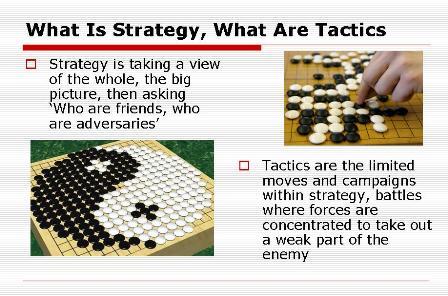 Keep On Keepin' On Keep On Keepin' OnHating the 'Middle Class,' Why Socialists Run in Elections, Strategy and Tactics Slide Slow, Class and Privilege, the Green New Deal ...and other Short Posts on Tumblr by Carl Davidson
|

Edited by Carl Davidson Revolutionary Youth and the New Working Class: The Praxis Papers, the Port Authority Statement, the RYM Documents and other Lost Writings of SDS Changemaker, 273pp, $22.50
For the full contents, click the link and view 'Preview' under the cover graphic.
|
|
By Randy Shannon, CCDS

"Everyone has the right to work, to free of employment, to just and favorable conditions of work and to protection against unemployment."
- United Nations Universal Declaration of Human Rights, December 10, 1948
I. Introduction
The "Great Recession" that began in 2007 has caused the greatest percent of job losses since the Great Depression of 1929. This crisis is the end of an era of unrestrained 'neo-liberal' capitalism that became public policy during the Reagan administration. The crisis marks a new level of instability with the growth of a global financial elite that targeted US workers and our trade unions after World War II.
|
|
Order Our
Full Employment Booklets
 |
 The new annual edition of our journal of discussion and analysis is now out. More than 170 pages, it includes 14 articles on strategy austerity, organizing, and the right. Cost is $10 plus shipping. Or get one by becoming a sustainer. Click the title to buy it directly. The new annual edition of our journal of discussion and analysis is now out. More than 170 pages, it includes 14 articles on strategy austerity, organizing, and the right. Cost is $10 plus shipping. Or get one by becoming a sustainer. Click the title to buy it directly.
|
...In a new and updated 2nd Edition
Capitalism may well collapse under its own excesses, but what would one propose to replace it? Margaret Thatcher's mantra was TINA...There Is No Alternative. David Schweickart's vision of "Economic Democracy" proposes a serious alternative. Even more fundamentally, it opens the door to thinking about alternatives. His may or may not turn out to be the definitive "successor system," but he is a leader in breaking out of the box. |
 by Paul KrehbielAutumn Leaf Press, $25.64
by Paul KrehbielAutumn Leaf Press, $25.64 | | Shades of Justice Video: Bringing Down a President, Ending a War |
|
 By Giuseppe Fiori
Verso, 30 pages
|

Essays on Mondragon, Marx, Gramsci
and the Green and Solidarity Economies |
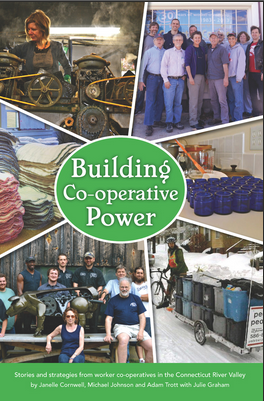
The Story of Workers Coops
in the Connecticut River
Valley Today.
Coauthors: Janelle Cornwell
(Worcester State University),
Michael Johnson (Grassroots
Economic Organizing Newsletter)
and Adam Trott (Valley Alliance
of Worker Co-operatives and
Collective Copies)
|

- Foreword by Susan Brownmiller
- Preface by Ken Wachsberger
$37.50 + $6 shipping
|
|
Discussion Documents for a Militant Movement

By Don Hamerquist. Reviewed by J Sakai
|
|
|
|
An Invitation to CCDSers and Friends...
 'Street Heat' and 'Street Heat' and
Organizing Bringing
Progressive Change
We're the Committees of Correspondence for Democracy and Socialism...Do you have friends who should see this? Pass it on...Do you have a blog of your own? Others you love to read every day? Well, this is a place where you can share access to them with the rest of your comrades. Just pick your greatest hits for the week and send them to us at carld717@gmail.com!
Most of all, it's urgent that you support a raise for low-wage workers, oppose militarized police and the ongoing 'long wars,' plan for 2016 races now, oppose austerity, support the 'Moral Mondays' in North Carolina and other states, the fight for the Green New Deal, a just immigration policy and the Congressional Progressive Caucus' 'Back to Work Budget'! We're doing more than ever, and have big plans. So pay your dues, make a donation and become a sustainer. Do it Now! Check the link at the bottom... |
States' Minimum Wages Rise, Helping Millions

Fast-food and health care workers, and supporters, demonstrated in Los Angeles on Dec. 4 in a nationwide rally for higher pay.Robyn Beck / Agence France-Presse - Getty Images
By RACHEL ABRAMS
Progressive America Rising via New York Times
Dec 31, 2014 - For some low-wage workers, everyday tasks like spending money for bus fare to get to and from work also involve deciding which bill to pay or delay, or what to give up.
Rita Diaz, 26, who works two low-wage jobs, sometimes walks the three miles home from her job serving chicken at a Popeye's fast-food restaurant in Roslindale, Mass., when she doesn't have money for all of her expenses. Her plight is one of many highlighted by labor advocates who have been pushing for higher minimum wage levels.
In January, with an increase in the minimum wage in Massachusetts taking effect - raising hourly pay to $9 from $8 an hour - Ms. Diaz envisions being able to walk less and ride more.
"I need to make a decision to buy clothes, or pay the rent or pay my cellphone bill," she said. "Now I've got to do that decision, but I'm going to have more money for me, too. A little bit of money for me."
By Thursday, minimum wage increases will go into effect in 20 states, including Massachusetts, as well as in the District of Columbia. A few other states will enact a pay bump later in the year.
All told, 29 states will exceed the federal minimum wage of $7.25 an hour at the beginning of January, according to the National Conference of State Legislatures.
The initial changes will enhance minimum pay by as little as a few pennies to as much as $1.25 an hour, affecting about 3.1 million employees, according to the Economic Policy Institute, a liberal research group.
"That's going to be unnoticeable, really," Gary Burtless, an economist at the Brookings Institution, said of some of the smaller changes, like the extra 12 cents an hour in Florida and 15 cents an hour in Missouri. "If you're talking about an increase of a buck or two bucks, then maybe there's some kind of noticeable effect."
Nine states are increasing their minimum wage levels through automatic adjustments for cost-of-living expenses and other economic factors. Increases in the other states occurred through legislative or ballot changes. Over all, the new laws will cover about 60 percent of the nation's work force, according to the Economic Policy Institute.
"If you're only making 15 or 16 thousand dollars year, an extra two grand is quite a bit of money," said David Cooper, an economic analyst at the institute. ...(Click title for more)
|
|

By Chris Maisano
Jacobin
As late as 2008, it was not unreasonable to think that the stars were aligning for a long-awaited revitalization of the US labor movement.
The financial crisis focused popular anger on the Wall Street financiers whose speculative activities brought the global economy to the brink of collapse. The election of Barack Obama and Democratic majorities in both houses of Congress raised labor's hopes for the passage of an economic recovery program and long-sought labor law reforms.
And it seemed as if workers themselves were finally willing to take action against the decades-long trend of increasing corporate power and inequality.
The occupation of the Republic Windows and Doors plant in Chicago by a militant United Electrical Workers local - an action that drew approving notice from the president-elect and much of the public - electrified labor's ranks and seemed to echo President Franklin Roosevelt's support for unionization and collective bargaining during the New Deal.
This appeared to be the most favorable set of circumstances for the US labor movement in decades, and the first significant hope for revitalization since the successful Teamsters strike against UPS in 1997.
It didn't happen. Labor law reform was sidelined in favor of health care reform, and the Republicans rolled up big electoral wins at all levels in 2010 and 2014. Despite widespread popular anger at the multi-trillion-dollar bank bailouts, the financial sector has come out of the crisis stronger, and corporate profits are at record levels. Economic inequality has continued its upward path.
Fast food and retail workers have shown a new willingness to protest and engage in collective action, and their efforts have spurred minimum-wage increases in a number of states and cities. Still, private-sector unionization continues to move toward total collapse. And in the public sector, the labor movement's last stronghold, state-level attacks on collective-bargaining rights and anti-union cases in the judicial system have set the stage for a decisive offensive against organized working-class power.
The writing is on the wall: unions as we have known them since the 1930s are in their terminal stage, and likely have only a short time left as a social institution of any major political significance. The private sector is essentially union-free, and public-sector unions don't have the capacity to defend themselves against legislative and judicial assaults, even in states that are supposedly union strongholds (see Wisconsin and Michigan).
Anti-union forces can taste the blood in the water, and their offensive is only getting broader. Between efforts to pass right-to-work laws at the state and local levels and legal challenges like Harris v. Quinn and Friedrichs v. California Teachers Association, the legal-institutional basis of US trade unions is being dismantled. And once that's lost, it will probably be impossible to bring unions back as they were before.
For the last two decades, Thomas Geoghegan has been one of the most astute chroniclers of the labor movement's excruciating decline. His first book, Which Side Are You On?, is a classic - unique among its peers for the liveliness of its prose, its focus on the lives of the rank-and-file, and its honesty about the many shortcomings of unions and their leaders.
As a lawyer who cut his teeth defending dissident members of the United Mine Workers and the Teamsters as well as the venerable Association for Union Democracy, Geoghegan has an intimate understanding of how unions have often failed to adequately represent their members and live up to their promise.
His dissatisfaction may have prompted him to look overseas. His last book, Were You Born on the Wrong Continent, is a paean to the European welfare states. And his new book, Only One Thing Can Save Us, faces up to the grim realities confronting unions and makes the case for a US labor movement of a new type, one that eschews the traditional models of unionization and collective bargaining and takes its cues from counterparts abroad....(Click title for more)
|
Hello Praxis readers. Welcome to 2015. We launch the second year of Praxis Center with the first of a three-part series, Rage Against the Narrative, by Senior Editor Dr. Lisa Brock. Brock is a historian who is attentive to the way current issues have deep historical roots but are often overlooked or negated in popular renderings. She is also interested in disrupting and disturbing subliminal power conventions that become so normalized that they are often invisible to some yet cause ongoing psychic harm to others. The series is written in response to the uprising sparked by the killings of unarmed black people throughout the US. The three epigraphs below are gestures to each part.
By Lisa Brock
Praxis Center, Kalamazoo
Part I: 'The Whole Damn System'
Jan 5, 2015 - The uprising in Ferguson, which has spread throughout the country in response to police and state violence against black people, has proven cathartic to a disillusioned and weary populace. In the words of James Baldwin in his 1966 essay, "A Report from Occupied Territory," what was unleashed by Ferguson, was simply an overflow of the "unimaginably bitter cup."
Every African-American, almost to a person, has had unprovoked experiences with the police and a relationship in some way with a brutal and unjust Prison Industrial Complex. And every black family and community has experienced violence, frame-ups, and/or unwarranted death at the hands of police and state agencies. African-Americans and their allies of all strata, from youth to professional athletes to congressional aides and middle school children, are standing up because we need to; we have to. We have all been waiting for this moment to collectively speak this "truth to power".
Power, however, is not happy. Resistance is, after all, the ultimate challenge to the master narrative. It reveals for all to see the lies and contradictions in not only the master's actions but also its myths. According to Jean-François Lyotard, Master Narratives or Grand Narratives are the big stories, began during ancestral times that justify society and its power relations. The settlement of the pilgrims, the melting pot, manifest destiny, and capitalism are among the anchors of the US Grand Narrative. The historical plot of police as a benevolent institution that serves and protects is a meta-narrative. It is a story, among many, that supports the grand tale.
*****************************
What might be called modern police emerged during the early 19th century in largely northern cities where the political party in power controlled the police forces. Hired and fired by mayors, police chiefs would order their men to engage in political campaigning and to harass political opponents. Police were also instructed to engage in social welfare for white citizens in order to maintain party loyalty and secure white male votes. By the latter 19th century, as black and immigrant numbers increased in the cities, fighting street crime, preserving "social order," and protecting the property of the mercantile classes became the primary tasks of police forces. As Police Studies scholar Gary Porter has noted, "What constitutes social and public order depends largely on who is defining those terms." I would add to that, crime. Crime was largely defined as the petty theft and disturbances of the working classes....(Click title for more)
|
|
Photo: Kurdish Militia Fighting ISIL
After years of lies and senseless military conflict, we must oppose US escalation in Iraq
By Reese Erlich
Beaver County Peace Links via al-Jazeera
Dec 30, 2014 - The latest iteration of the Iraq War is already starting to escalate. The day after Christmas, U.S. forces and its allies hit the Islamic State of Iraq and the Levant (ISIL) with 31 airstrikes in Iraq and Syria.
Three thousand U.S. military advisers are now authorized to accompany Iraqi troops into combat, while American helicopter pilots fly combat missions over Iraq. Chairman of the Joint Chiefs of Staff Martin Dempsey and Secretary of State John Kerry want to keep open the option of officially dispatching combat troops.
In northern Iraq, many Sunni and some Shia political leaders told me they remain suspicious about renewed American involvement. This came as no surprise. The United States, after all, invaded Iraq only a little more than a decade ago on the false pretense of eliminating weapons of mass destruction. Its new stated aims seem to many to be almost as implausible.
In August a U.S. diplomat rattled off to me the three original justifications for the new war: stopping the immediate slaughter of minorities fleeing attacks by ISIL, protecting American military personnel in the northern city of Erbil and keeping ISIL from overrunning the Kurdish region.
None of those rationales hold up under scrutiny.
Larger goals
First, despite alarmist claims, ISIL lacks the ability to overrun the Kurdish region. It could never occupy an area in which 8 million Kurds live and tens of thousands are organized into well-trained militias.
Second, U.S. goals are much larger than protecting minorities and military personnel. On Aug. 8 the U.S. began bombing Iraq. By Aug. 14 the Pentagon determined that minorities were no longer fleeing ISIL. American military and diplomatic personnel were in no real danger either. The airports remained open during the crisis, and the military could have evacuated personnel quickly. Yet the U.S. intensified the bombing at that point.
The United States is waging the present conflict in part because it lost the last Iraq War. The U.S. had hoped to overthrow Saddam Hussein, install a friendly government in Baghdad and reassert U.S. influence throughout the region. But in 2008, George W. Bush's administration signed a status of forces agreement that codified the U.S. defeat. By the end of 2011, the United States withdrew its troops, closed its military bases, and the independent government in Baghdad ended up being more friendly to Tehran than to Washington.
The US claims it will vet moderate rebels, send them to Saudi Arabia for training for one year and then return them to Syria. Even Vice President Joe Biden admitted that the Saudis helped arm extremist rebels for years.
Critics such as Sen. John McCain and former head of the Central Intelligence Agency Leon Panetta argue that political leaders gave away gains made by the military because of their lack of political will. But U.S. Army Gen. Daniel P. Bolger points out that the U.S. was defeated both politically and militarily; it was forced out of Iraq. ...(Click title for more)
|
From Suites to the Streets: Climate Justice in Peru
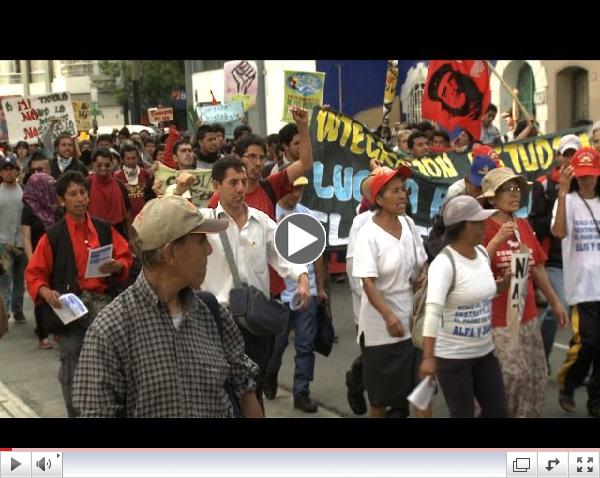 | |
Protesters Call for Climate Justice
at Corporate Gathering in Lima
|
|
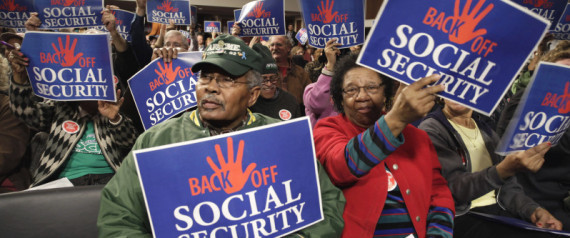
Advocacy groups vow to fight back against what they believe is a preliminary "stealth attack" that portends a wider assault on a program that makes survival possible for millions of vulnerable Americans
By Jon Queally
Common Dreams
Jan 7, 2015 - As Los Angeles Times columnist Michael Hiltzik immediately remarked: "Well, that didn't take long."
An attack by the Republican Party on the nation's Social Security program took less than one full working day.
Included in a new set of rules passed by the House of Representatives on Tuesday was a new measure making it more difficult to move funds between separate accounts maintained by the Social Security Administration. A seemingly technical provision on the surface, critics says it puts millions of disabled and elderly Americans at risk and sets the stage for further attacks aimed at the wider program.
"The GOP is inventing a Social Security crisis that will threaten benefits for millions and put our most vulnerable at risk." -Sen. Elizabeth WarrenAccording to Hiltzik:
The rule hampers an otherwise routine reallocation of Social Security payroll tax income from the old-age program to the disability program. Such a reallocation, in either direction, has taken place 11 times since 1968, according to Kathy Ruffing of the Center on Budget and Policy Priorities.
But it's especially urgent now, because the disability program's trust fund is expected to run dry as early as next year. At that point, disability benefits for 11 million beneficiaries would have to be cut 20%. Reallocating the income, however, would keep both the old-age and disability programs solvent until at least 2033, giving Congress plenty of time to assess the programs' needs and work out a long-term fix.
The procedural rule enacted by the House Republican caucus prohibits the reallocation unless it's accompanied by "benefit cuts or tax increases that improve the solvency of the combined trust funds," as paraphrased by the National Committee to Preserve Social Security and Medicare.In practical terms, the advocacy committee says, that makes the reallocation impossible; it mandates either benefit cuts across the board, which aren't politically palatable, or a payroll tax increase, which isn't palatable to the GOP.
In response to approval of the new rule, Sen. Elizabeth Warren (D-Mass.) chastised Republicans in the House.
"The GOP is inventing a Social Security crisis that will threaten benefits for millions and put our most vulnerable at risk," Warren fumed via her Twitter account. "This is ridiculous. 233k people in MA receive Social Security disability benefits that could be threatened by these political games."
"All of these divide-and-conquer strategies are intended to turn Americans against each other so that all of their benefits can be cut." -Nancy Altman & Eric Kingson, Social Security Works
Advocacy groups like AARP and the National Committee to Preserve Social Security and Medicare expressed outrage....(Click title for more)
|
|
Protestors in Ferguson try to protect a business from being looted
By Jamala Rogers
Black Commentator
One of the elements of the Ferguson uprisings which has received lots of attention has been the issue of looting. For many, this display of unbridled and righteous outrage is new and unsettling.
Ferguson is not my first uprising. I'm also connected to community organizers in other cities where rebellions have taken place over the decades - Newark, Detroit, Miami, Los Angeles, etc.; we've shared our experiences on looting and arson. I'm going to share the accumulated insights on the topic.
White, mainstream media is having a field day with the images of looting. It fits into their ongoing narrative that black people are sub-human criminals and are undeserving of full citizenship in this society. These folks will hang on to anything as justification for trying to maintain our second-class citizenship.
I have heard from black people from all around the country, essentially reacting to the voices of conservatives and the mainstream press which projects looting images out of Ferguson and St. Louis as the real problem. Middle-class black folks seemed to be embarrassed as if they would have to be personally responsible for the looters captured on video hauling out goods from ransacked businesses. Black folks have to unload the burden often placed on us by the oppressor to be responsible for every wrong thing another black person does. We are not. When black people get roped into this trap, they affirm the efficacy of the strategy - to distract from the systemic issues of structural racism and police violence. I tell them if you're talking about looting instead of justice for Mike Brown and the many other acts of police terror, the racist power structure has already won in the court of public opinion.
There are basically four kinds of looters/arsonists. One, is people whose rage ends up being misdirected at property. Another group is straight-up opportunists (both outsiders and locals). A subset of the opportunist group is property owners who are looking to cash in on insurance policies. The last grouping is the police and their hired agents.
In the first grouping, people feel so disconnected and alienated from their community that they have no sense of the loss a grocery store or gas station has for them or their family. They want to put a hurting on someone or something. Strangely, all of these folks aren't always interested in the looting part; they are more interested in how much pain (damage) they can inflict on "the other." This takes the form of smashing windows, overturning cars and torching stuff.
There a couple of types of opportunists in uprisings like Ferguson. Some do it for the adrenalin rush - getting that high from a smash and grab and then if successful, having the bragging rights about the bounty. Others see it as reciprocity for the injustices they have endured and now have a chance to even the score. A few will even admit later that they snatched items they didn't need or want but noted that it felt good to "take" something since the system has been taking from them. I call it misdirected because the collateral damage is usually small businesses and not the blood-sucking corporations who are looting our communities and government coffers daily.
When an uprising is imminent, there are some crafty business or property owners who start smelling dollars or a way out. These folks are keenly aware that it will be a challenge for any investigation to trace arson back to them. At the end of their insurance rainbow will be a payout either to rebuild bigger and better or they can take the money and run.
The role of the law enforcement must be truly understood in uprisings because there have multiple outcomes they seek. In Ferguson, police, the National Guard and Governor Nixon have already been criticized by shop owners and citizens who question whether there was any real protection of their businesses in the aftermath of the grand jury decision. How could twenty or so businesses burn to the ground within a few blocks (mainly on West Florissant) when Ferguson had damn near as many troops on the streets as Iraq has now? And didn't the Governor publicly promise to protect their property?...(Click title for more)
|
By Andrew O'Hehir
Progressive America Rising via Salon
Jan 5, 2015 - In 1935, with Hitler and Mussolini forging a historic alliance in Europe and the world sliding toward war, Sinclair Lewis published the satirical novel "It Can't Happen Here,"which depicted the rise of an indigenous American fascist movement.
Lewis is a fine prose stylist, but this particular book has an overly melodramatic plot, and is highly specific to its era. It has not aged nearly as well as "Brave New World" or "1984," and not many people read it today. (At the time, it was understood as an attack on Sen. Huey Longof Louisiana, the populist firebrand who was planning to run against Franklin D. Roosevelt in 1936, but was assassinated before he could do so.)
But certain aspects of Lewis' fascist America still resonate strongly. His clearest insight came in seeing that the authoritarian impulse runs strong and deep in American society, but that because of our unique political history and our confused national mythology, it must always be called by other names and discussed in other terms.
Oh, yeah - Happy New Year, everybody! Now let's get back to fascism. When the "Corpo" regime installed by tyrannical President Buzz Windrip in "It Can't Happen Here" strips Congress of its powers, tries dissidents in secret military courts and arms a repressive paramilitary force called the Minute Men, most citizens go along with it. (Yeah, some of that sounds familiar - we'll get to that.)
These draconian measures are understood as necessary to Windrip's platform of restoring American greatness and prosperity, and even those who feel uncomfortable with Corpo policies reassure themselves that America is a special place with a special destiny, and that the terrible things that have happened in Germany and Italy and Spain are not possible here. No doubt the irony of Lewis' title seems embarrassingly obvious now, but it was not meant to be subtle in 1935 either. His point stands: We still comfort ourselves with mystical nostrums about American specialness, even in an age when the secret powers of the United States government, and its insulation from democratic oversight, go far beyond anything Lewis ever imagined.
I'm not the first person to observe that the New York police unions' current mini-rebellion against Mayor Bill de Blasio carries anti-democratic undertones, and even a faint odor of right-wing coup. Indeed, it feels like an early chapter in a contemporary rewrite of "It Can't Happen Here": Police in the nation's largest city openly disrespect and defy an elected reformist mayor, inspiring a nationwide wave of support from "true patriots" eager to take their country back from the dubious alien forces who have degraded and desecrated it.
However you read the proximate issues between the cops and de Blasio (some of which are New York-specific), the police protest rests on the same philosophical foundation as the fascist movement in Lewis' novel. Indeed, it's a constant undercurrent in American political life, one that surfaced most recently in the Tea Party rebellion of 2010, and is closely related to the disorder famously anatomized by Richard Hofstadter in his 1964 essay "The Paranoid Style in American Politics." ...(Click title for more)
|

'Survivor' producer David Burris' directorial debut is a backwoods drama in the mode of 'Winter's Bone.'
By Dennis Harvey
Variety
Jan 7, 2015 - Longtime "Survivor" producer David Burris' feature directing debut, "The World Made Straight," is an adaptation of Ron Rash's 2006 novel about some hard-luck folk in 1970s rural Appalachia.
This evenly paced drama holds interest with its uneasy character dynamics, interesting milieu and effective performances, though a story so frequently on the verge of violence ought to build more tension than Burris manages, while flashback elements that presumably worked on the printed page feel awkwardly integrated here.
Ultimately a solid if not completely successful effort comparable to such recent backwoods coming-of-age character studies as "Winter's Bone" and "Joe," the pic launches theatrically and on VOD Jan. 9. The cast's more familiar names should steer it toward a modest payoff, primarily in home formats.
Fired from his supermarket cashier job when he lets a poor customer leave without paying, 17-year-old high-school dropout Travis Shelton (Jeremy Irvine) is understandably moody and gruff: His prospects in this late-'70s western North Carolina region are near-nil. If that weren't already depressing enough, there's always his bullying pa (Alex Van) to insist he'll never amount to anything.
Out fishing one day, Travis stumbles upon some marijuana plants. His pal Shane (Haley Joel Osment) hooks him up with disgraced local schoolteacher-turned-dealer Leonard, aka "the Professor" (Noah Wyle), who agrees to buy the pilfered goods but advises the youth to quit such risky doings while he's ahead. Nonetheless, Travis sneaks back, now blatantly stealing from the crop of scary hillbillies Carlton Toomey (musician Steve Earle) and his son Hubert (Marcus Hester). Unfortunately for him, he steps right into a waiting bear trap. The Toomeys decide to let him live, albeit with a stern warning against any future meddling in their business.
His wound requiring a hospital stay, Travis gains a potential girlfriend in sweet-natured student nurse Lori (Adelaide Clemens), but upon release discovers he is no longer welcome at home. With nowhere else to go, he lands on the doorstep of Leonard, who's already got his hands full minding his self-proclaimed-drug-addict g.f., Dena (Minka Kelly). Nonetheless, he lets Travis crash, even encouraging him to study for his GED. The two men also find common ground when the younger grows fascinated by the elder's collection of local Civil War artifacts - notably some yellowed journals detailing tragic events including a notorious massacre in which several of Travis' ancestors were executed.
This historical angle is intriguing, though despite frequent voiceover diary excerpts and dramatic flashbacks, it never quite gels as key to the main narrative. We get that Travis is meant to be discovering himself through this family backstory, yet that doesn't register strongly enough, particularly when he has a falling out with his benefactor over "kin" issues nearly 120 years old....(Click title for more)
|

Hunter Pitts O'Dell testifies before the Senate Internal Committee, April 12, 1956 (AP photo)
The career of Hunter Pitts O'Dell is a crucial episode in the hidden history of American radicalism.
By D.D. Guttenplan
The Nation
Who Is Jack O'Dell? That is the question Victor S. Navasky sets out to answer in The O'Dell File (Kindle Single: $ 2.99). To J. Edgar Hoover, O'Dell was the Communist puppet-master pulling the strings in the civil rights movement of the 1950s and '60s.
To Martin Luther King Jr., he was a trusted counselor and talented organizer whose pioneering work in direct-mail fundraising furnished the financial sinews that made nonviolent resistance to segregation a viable-and winning-national strategy.
He ran the Southern Christian Leadership Conference's Harlem office, and when Maya Angelou resigned from the SCLC's Atlanta-based Voter Education Project he took on that role as well. To President John F. Kennedy and his brother Robert, O'Dell was a dangerous man-and getting rid of him the price that King had to pay for presidential support.
Yet O'Dell's career as a radical thinker, inspirer, fomentor of protest and strategist of progressive politics was far from over.
Becoming a fixture at Freedomways, the quarterly founded by W.E.B. Du Bois, O'Dell furnished the intellectual bridge linking the struggles of activists like Du Bois and Paul Robeson with the generation of Montgomery and Mississippi. In articles and unsigned editorials he publicized the work of the Student Non-Violent Coordinating Committee-especially in making connections between capitalism, racism and American imperialism. And he played a pivotal, if unacknowledged, role in moving civil rights activists such as King to open opposition to the war in Vietnam.
Years later Jesse Jackson brought O'Dell into PUSH (People United to Save Humanity) and the Rainbow Coalition, where among other services he provided the economic and foreign policy analysis that found such wide national resonance in Jackson's presidential campaigns (though O'Dell disagreed with Jackson on the wisdom of tethering his efforts to the fortunes of the Democratic Party). Despite having never completed his own college degree (in pharmacy), O'Dell also became one of the most inspiring teachers at Antioch College's graduate school of education in Washington. And though at 91 he is officially retired, O'Dell has never stopped writing, speaking, teaching and inspiring generations of radicals.
The career of Hunter Pitts O'Dell (his full, if rarely used, name) is a crucial episode in the hidden history of American radicalism. The son of a janitor at the Detroit public library, and great-grandson of a slave who ran away to the Union army, he was an altar boy who pledged Alpha Phi Alpha fraternity but dropped out of college to join the Merchant Marine. A fiery organizer for the National Maritime Union who joined the Communist Party after returning to a segregated United States-only to leave when he realized that civil rights needed to arrive before socialism could be achieved.
O'Dell is what Woody Allen's Zelig might look like if he had black skin and radical politics. Only O'Dell is real. And you've probably never heard of him. Thanks to The Nation's own Victor Navasky that may be about to change. The O'Dell File, an e-book published just last week, is a fascinating portrait of this compelling, and unforgettable, crusader. An inspiring story of how much difference one person can make, it's also a sobering reminder of the terrible cost-to our politics, and to our country-of the lives, and decades, lost to the McCarthy witch hunts.
[Editors Note: Jack O'Dell is also a CCDS member, and CCDS has been working on his current project, The Democracy Charter]
|
|
Keep up with the Moral Mondays with a Red Resolution...
Become a CCDS member today!
 The time is long past for 'Lone Rangers'. Being a socialist by your self is no fun and doesn't help much. Join CCDS today--$36 regular, $48 household and $18 youth. The time is long past for 'Lone Rangers'. Being a socialist by your self is no fun and doesn't help much. Join CCDS today--$36 regular, $48 household and $18 youth.
Better yet, beome a sustainer at $20 per month, and we'll send you a copy of Jack O'Dell's new book, 'Climbing Jacobs Ladder,' drawing on the lessons of the movement in the South in the 1950s and 1960s.
Solidarity, Carl Davidson, CCDS
|
|
|